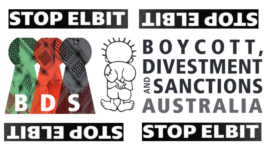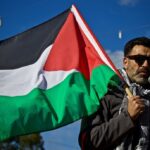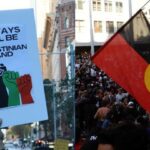“A Progressive Escalation of BDS Actions Worldwide”: An Interview With BDS Australia

Apartheid was a system of racial segregation implemented by the South African government in 1948, which saw the white minority rule over the Black South African people of that nation in an authoritarian manner that violently oppressed and impoverished the majority of its peoples.
Amnesty International and other human rights organisations have, over the last decade, declared that the state of Israel is also running a system of apartheid, whereby the Indigenous Palestinians of the land are systematically discriminated against, brutalised and their human rights denied.
The system in South Africa was brought down by the Anti-Apartheid Movement (AAM), which formed in London circa 1960 and began as a boycott on South African goods but developed into mass global boycotts and economic sanctions. And in 1994, the apartheid regime fell.
The BDS (Boycott, Divestment and Sanctions) movement was established by Palestinians in 2005, and it’s based on the same principles but focused on Israel. And cofounder of BDS Australia, Hilmi Dabbagh explained in a 2019 interview that BDS is impacting Israel at a much faster rate than AAM did South Africa.
Former Marrickville Greens councillor Cathy Peters cofounded BDS Australia with Dabbagh.
Peters is also the councillor who moved a successful motion in December 2010, which saw the local government in Marrickville commit to divesting from and boycotting Israel and international corporations that were supporting Israel’s apartheid and persecution of Palestinians.
But that arrangement only stood until April 2011, and that was due to a significant extent, as Peters tells it, to the federal member of the area, and his party in general, applying pressure till a majority of Marrickville councillors broke, and that politician was today’s Labor PM Anthony Albanese.
Right now, and due in large part to the Gaza genocide, Dabbagh’s understanding that the BDS movement is impacting at an accelerating pace is self-evident, as all one has to do is scroll through any social media platform and terms like divest and boycott being linked to Israel are all-pervasive.
Sydney Criminal Lawyers spoke to BDS Australia’s former convenor, Cathy Peters, who explained BDS Australia has recently merged with APAN (Australia Palestine Advocacy Network) which will increase its capacity, at a time when global protests are increasingly focusing on BDS action.
In mid-April, when the university Gaza solidarity encampments and the controversial backlash against them commenced, suddenly the concept of divestment was front and centre.
This followed months of prominent calls for boycotts of multiple companies, to the point that Starbucks outlets in Sydney looked empty compared to this time last year.
Cathy, from your perspective, how has the Boycott Divestment and Sanctions movement, which you’ve been involved in for at least a decade and a half now, grown over recent months?
The Boycott Divestment and Sanctions movement has grown hugely as a result of Israel’s genocidal attack on Gaza over the past 8 months.
After October 7, many organic boycotts emerged as people were desperate to take action in the face of the government’s inaction.
So we saw a rush of spontaneous international calls for boycotts on McDonalds, Starbucks and other companies that were supporting the Israeli attack on Gaza.
Since then, there’s been a move to look at more strategic targets, which are the BDS movement’s focus, as the level of complicity in Israel’s genocide, apartheid and persecution rests far more heavily on key international companies that directly enable Israel’s human rights abuses to continue.
During one of Israel’s previous massacres in Gaza, 2008’s Operation Cast Lead, the BDS movement called on dock and maritime workers to refuse to load or offload Israeli ships.
The #BlocktheBoat movement has continued, and unionists worldwide have taken action in solidarity with the call from Palestinians to boycott Israeli ships.
We’re now seeing actions at many Australian ports and internationally against the Israeli company ZIM Shipping, which has been transporting and delivering weapons and goods to Israel for decades.
Unionists for Palestine and the Palestine Justice Movement in Sydney and Free Palestine Melbourne have led the current Australian boycott ZIM shipping campaign with protests at ports in Sydney, Melbourne and Fremantle initially. A National Day of Action to boycott apartheid Israel and ZIM shipping at all capital city ports occurred on the 25th of May.
The Maritime Union of Australia Sydney Branch has supported all these protests.
We’ve also seen a huge upsurge in student activism and the establishment of student encampments demanding universities reveal and then divest from their ties with weapons companies, Israeli universities and complicit institutions and companies, such as Elbit. This is a watershed moment for Palestine solidarity and BDS in Australia.
Aligned with all of these developments have been boycott actions targeted at weapons and weapons component manufacturers, such as Bisalloy, Thales, Quickstep, Elbit, Ferra, L3Harris and BAE Systems Australia.
The Australian government has issued hundreds of military export permits to Israel and also facilitates the export of weapons components for the F35 fighter jet, which Israel uses to bomb Gaza.
PSA for Palestine involves public servants calling for action from the government, which is a big development. And sanction calls have been coming from peak human rights organisations, like Amnesty International Australia, and high-profile artists, commentators and lawyers.
Cultural and sporting boycott calls have intensified, including calls on SBS to not screen Eurovision, as Eurovision would not ban Israel’s participation.
The Palestine Football Association in May called for a boycott/ban on Israel competing in the FIFA World Cup, and this call was echoed by one of Australia’s former international soccer players and now high-profile human rights advocate, Craig Foster.
How would you say the BDS movement had been growing in this country prior to last October? And why had it been gaining traction?
The BDS movement had grown solidly prior to October 7 in a number of significant ways.
In 2022, Palestinian Australian artists and arts workers initiated a hugely successful boycott action against the Sydney Festival for its acceptance of Israeli sponsorship funds.
This boycott saw at least 100 artists withdraw from the festival in protest of the board’s refusal to reject these funds and spotlighted the effectiveness of the BDS movement’s cultural boycott internationally.
Subsequently, the Sydney Festival resolved not to accept funding from any foreign government as a way of sidestepping the issue.
However, this action has put all cultural institutions and festivals on notice that they will be targeted if they accept artwashing by the apartheid Israeli government.
Also, we saw a rise in student activism on campus with key student councils and national bodies passing BDS resolutions. The National Union of Students in December 2022 resolved to recognise and oppose “the system of apartheid and genocide against the Palestinian people, enforced by the state of Israel.”
NUS unconditionally pledged its support to “the ongoing resistance of the Palestinian people for justice and freedom” and added its support to “the Palestinian solidarity campaign, including the campaign for Boycott, Divestment and Sanctions (BDS)”. It further added that it “will defend affiliated student unions when they too demonstrate support for Palestine.”
This student pressure increased on a number of campuses especially at RMIT, where BDS Australia had been actively calling for the university to end its partnership with Elbit from 2022.
After a year of advocacy and student and community activist led protests and marches, RMIT ended its complicity with Israel’s largest weapons manufacturer in October 2023.
This was a major win for BDS and for student action on partnerships and collaborations between arms companies and universities on campuses throughout Australia.
The University of Melbourne Student Union in August 2022 and the University of Sydney Student Representative Council in August 2023, both passed motions supporting BDS tactics and the aims of the BDS movement generally.
BDS Australia had worked with students for Palestine groups nationally for some time and in 2023 wrote to every student representative council and key student officers in all major Australian universities about the need to take BDS action, given the escalating actions of the far-right Netanyahu government and its ongoing apartheid and persecution of Palestinians.
The BDS call for divestment has been growing with BDS Australia’s superannuation divestment campaign that’s involved well over 10,000 people, who’ve taken action so far calling on their superannuation funds to reveal and divest from any investments in the 97 UN-listed companies and entities that are operating in the illegal Israeli settlements.
A lot of superannuation funds have these wonderful sounding ethical frameworks, but virtually all of them – most of them – have some investments in the listed companies that are operating in the West Bank settlements.
The UN put out a list of 112 companies, a few years ago, that were definitely operating in breach of international law. And then it refined this list to 97 companies. These are the companies profiteering from the settlements.
And the last development that expressed this broadening support was when the Greens passed a BDS resolution in June 2023. This was the formal adoption of the Greens support for boycott, divestment and targeted sanctions which had been growing in the Party for the last 14 years.
Federal Labor came to power promising to recognise Palestine. So, many have been surprised by the prime minister’s unbridled support for Israel since the genocide broke out.
But for many others who remember when Marrickville Council passed a motion to adopt a BDS boycott on Israeli products in December 2010, they’re not so surprised about Anthony Albanese’s actions at present.
You were the Marrickville Greens councillor that brought the successful motion that was then voted down in April 2011.
So, what happened back then? And how did Albanese’s actions at that time suggest he might be acting as he is now?
Marrickville Council, at the time, had a sister city relationship with Bethlehem Council. Also, over in Leichhardt, they had a sister city relationship with Hebron.
Many of the councillors at Marrickville had travelled to the West Bank. The council had even had a council officer from the Bethlehem Council come and spend three months at Marrickville Council.
So, when I put the BDS motion up in late 2010, it was almost unanimously supported with 5 Greens, 4 ALP and 1 Independent in favour and only two Independents against.
The idea was that as a result of supporting the boycott, council would prepare a report on the Council’s internal investments and contracts with companies that were BDS targets, such as Veolia at the time or HP.
Then in 2011, as we were coming close to a state election, ALP councillors were put under an enormous amount of pressure coming from head office. As well, there was enormous nationwide pressure coming in against Marrickville Council for the boycott.
The Israel lobby had managed to put all its forces into intense lobbying – slandering council and spreading mistruths about BDS, which the media and Labor duly recited.
Even the then foreign minister, Rudd and prime minister Gillard got milage out of this and firmed up the ALP’s cosy relationship with the Israel lobby. And, of course, it was another opportunity to attack the Greens.
Marrickville is in Anthony Albanese’s federal seat of Grayndler and the Greens mayor at the time, Fiona Byrne, was standing as the state candidate against Albanese’s former wife, Carmel Tebbutt.
The Greens vote was steadily growing in Sydney’s inner west and Albanese chose to attack the council and the Greens in what appeared to be a concerted attempt to thwart the Greens vote in the seat of Marrickville.
However, the Greens got the highest first preference vote for Greens in any seat in the election that year. And in the next election they won the seat, which is now called the state seat of Newtown.
What we saw then was the incredible opportunistic approach by Albanese, both to get more support from the Israel lobby for the Labor Party, statewide and nationally, and also to use this campaign as a tool against the Greens, with accusations of antisemitism. I understand that the ALP applied massive pressure on the four Labor councillors to vote to rescind the motion, which happened in 2011.
It was a difficult time for those four councillors, particularly one who was Lebanese, as they had strongly supported the BDS motion and were forced to back down.
Council was only going to investigate what investments we had and then progressively reduce those investments.
So, it could have been a completely normal thing for the council to do: to look at its ethical stand. But instead, it was hyped up to become a national scandal.
The Keneally state government talked about sacking the council if they dared to continue. It was shocking to see this pile on.
And yet, as councillors, we received thousands and thousands of emails of support from Australia and elsewhere.
There was a tremendous amount of support for it as there would be today as people want to see some real action taken against Israel’s ongoing ethnic cleansing, apartheid and land theft.
A prominent campaign that BDS Australia has been running over recent years involves divestment from Elbit Systems.
In 2022, the campaign resulted in the Australian Future Fund divesting from the company.
However, last year, it was exposed to have begun investing with Elbit again.
And much of the Australia public was disgusted to find that the Albanese government entered into a fresh $917 million contract with Elbit Systems in February this year.
So, why Elbit Systems? And how did you consider the news that our nation had entered into a new contract, four months into Israel committing the worst atrocity crime since World War II?
It’s obscene. I don’t think there is any other way to describe it. The Australian government has ongoing strong links with this company, you only have to look through the defence contracts to see that.
But to sign-off on this in the middle of a genocide was extraordinary.
Elbit is Israel’s biggest weapon’s manufacturer, and it sells its weapons “battle-tested”, meaning they’ve been tested on Palestinians in Gaza over successive attacks: this latest attack is just one of many over the last decades.
When BDS Australia first began, which was only in NSW, the Royal Flying Doctors were going to enter into a partnership with Elbit, at their Dubbo base.
We mounted a strong campaign highlighting to the flying doctors that it didn’t really suit their image to be seen to be partnering with a major weapons manufacturer, and subsequently, they cancelled any partnership that they’d been planning.
So, that was a very early success for BDS Australia. But Elbit has ties with state governments, as well.
The Victorian government put $20 million toward the Elbit Centre of Excellence in Melbourne, which is working on AI technology.
Elbit also partners with various university departments. As I mentioned, there was the Elbit partnership with RMIT, which we campaigned heavily on, and it was taken up by activists and students and the university pulled out of everything and they no longer have an association with Elbit.
So, it’s important that we call out this company and the way it operates in Australia. It’s an international BDS target and it has operated with impunity worldwide, and the Australian government doesn’t seem to have any concerns about it.
But this $917 million approval is really the last straw. People are becoming well aware of the Australian government’s absolute complicity by allowing that to go ahead.
Many people would consider going into a store and deciding to buy another brand of computer instead of a HP, because that company has strong ties with Israel, doesn’t really count for too much.
But why is that the wrong way to look at it? Why are boycotting, divesting and sanctioning such effective ways to create social change and indeed, bring down apartheid?
The BDS movement is a movement led and progressed by civil society, not governments. And the amount of pressure that you can put on key companies operating in apartheid Israel is huge.
As you know, the BDS movement has been modelled on the South African Anti-Apartheid Movement, which had huge success.
BDS has also been very successful in seeing companies ending associations with Israel, while it maintains its system of persecution and discrimination against Palestinians.
The impact is to make Israel stand out as the pariah state that it is.
This happens when large organisations refuse to contract with Israel, when musicians refuse to perform in the country, when academics and universities refuse to participate with Israeli universities, because most, if not all, Israeli universities are complicit in Israel’s persecution and oppression of Palestinians.
So, it is hugely important that civil society has a movement like this, where we see large international campaigns applying strong pressure despite government inaction. And that is the point.
While governments have been inactive, BDS has been growing and growing.
Major pension funds and superannuation funds in Europe and the US have pulled their funds out of any companies that are operating in the West Bank settlements.
The impact is huge. And Israel, of course, sees all this. Israel sees BDS as one of the major threats to its expansionist endeavours, and they’ve put enormous resources into countering BDS and slandering it as antisemitic, which it isn’t.
BDS is just human rights-based. It is based on international human rights law.
The only way that Israel is countering it is to claim antisemitism and to claim that BDS is attempting to destroy Israel, which is completely false.
And lastly, Cathy, BDS has gained a lot of traction over the last eight months due to the worst possible reason.
And another outcome of the genocide is it has turned world opinion on Israel and locally, here in Australia, it has exposed institutionalised bias in support of an apartheid nation.
So, with ideas like divestment and boycott becoming ubiquitous on screens globally, despite efforts at the highest levels to prevent this, how do you see BDS developing from this point on?
What we are seeing, and we will see, is a progressive escalation of BDS actions and impacts worldwide: by civilians, unions, academics, religious bodies and NGOs.
This will be heightened further as we see the final judgements from the International Court of Justice, and the arrest warrants from the International Criminal Court for key members of the Israeli government: Netanyahu and defence minister Gallant and others for the Israeli Gaza genocide.
So, progressively Israel will be shunned for its actions and face the consequences of increased boycotts and government sanctions.
A number of Israeli ambassadors have been forced to leave countries around the world, and a number of countries have already said they will implement the arrest warrants, including against Netanyahu.
And that is what Australia must do as well, if it supports international law.
So, the BDS movement will continue to grow and now with the activation of so many hundreds of thousands of people, because of the impact of the genocide, a movement akin to the anti-Vietnam war movement has developed.
I mean, we have just seen this incredible political awareness emerge on campuses around the world and it will only grow stronger.







